* You are viewing the archive for May, 2011
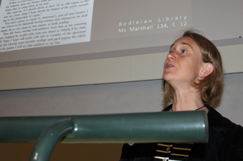
Dr van Romburgh during her talk.
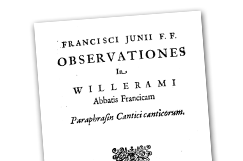
Junius's 'Observationes' from 1655.
In the fourth paper of our seminar series on Thursday 26 May, Dr Sophie van Romburgh (University of Leiden) spoke about ‘Reciprocal Bonds Between Words and Friends, or Correspondence According to Francis Junius’. In a poetic and suggestive analysis, van Romburgh outlined a new framework for appreciating the correspondence of the seventeenth-century philologist, which she edited in 2002, by turning to the closely related genre of commentary (the etymological elucidations of words and concepts in early modern source texts). Van Romburgh argued for a comparable set of ‘discursive dynamics’ between commentary and learned correspondence, and suggested that both attempted to add ‘lustre’ to objective, impersonal, abstract knowledge by embedding it within lived experience and wider networks of words, scholars, and friends. Not only does the thematic eclecticism and ‘easy mix’ of classical, biblical, and contemporary voices evident in Junius’s commentaries evoke the lively, promiscuous character of intellectual correspondence, but they also combine serious etymological pursuit with personal anecdote (especially evident in his ‘Observationes’ from 1655). This connects the ‘formal grid’ of the dictionary or source text with broader ‘constellations of knowledge and people’, relating the exotic and the arcane to the familiar and the experiential, and providing an example of early modern ‘associative rhetoric’ (Roberta Frank) in action. Junius’s commentaries also reference extra-textual conversations with scholar-friends, as do his letters; a powerful reminder that both commentary and correspondence existed within a voice-oriented culture (or ‘oral story world’), and superimposed a ‘vast, living world of spoken communication, of which only some glimpses make it to paper’. Cultures of Knowledge, argued van Romburgh, are created within this vast multi-dimensional space, and out of the lived practices of networks of scholar-friends (‘the ecology of early modern scholarship’). Questions focussed on national differences in discursive and communicative cultures; the social and political, as well as the discursive and intellectual, logic of early modern annotations; the pedagogical origins of associational thinking; and the very different historiographical trajectories described by the history of science and the history of scholarship. Seminars take place in the Faculty of History on George Street on Thursdays at 3pm. For future talks in the series, please see the seminar webpage.
 Podcast now available on the seminar page!
Podcast now available on the seminar page!
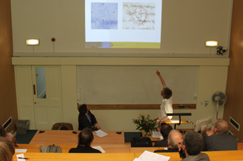
Erik-Jan points out the stamp which, when viewed under UV light, alerted him to the stolen Libri letter.
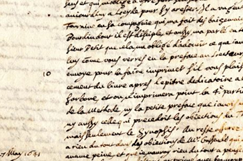
The stolen letter on the 'Meditations', discovered by Erik-Jan at Haverford College in 2010.
In the third paper of our seminar series on Thursday 19 May, Dr Erik-Jan Bos (University of Utrecht) gave a talk entitled ‘To the Editor’s Delight: The Loss, Theft, and Forgery of Descartes’ Letters’. In a fascinating and playful analysis, Bos described some of the most outrageous examples of intellectual fraud and finagling he has encountered during his intensive work on the 750-letter corpus. These include the mysterious disappearance of the Stockholm chest in the early 1700s (one of two left to posterity by the French philosopher); omissions, elisions, and other dubious practices by Claude Clerselier, the first editor of the correspondence; the pilfering of around eighty letters by the voracious eighteenth-century manuscript collector Guglielmo Libri (one of which, previously unknown, was discovered by Erik-Jan in Haverford College in 2010); and some sensational and implausible nineteenth-century counterfeits created by forger Denis Vrain-Lucas and sold to the unwitting mathematician and collector Michel Chasles, who proclaimed their authenticity to the French Academy of Science. A lively discussion focused on attempts to reconstruct the contents of the Stockholm chest, the circumstances surrounding Erik-Jan’s discovery of the lost Libri letter in a Pennsylvania library, and the reasons for the surprisingly high percentage of out letters in the Cartesian corpus (570 surviving letters are from him, and only 180 to him). Seminars take place in the Faculty of History on George Street on Thursdays at 3pm. For future talks in the series, please see the seminar webpage.
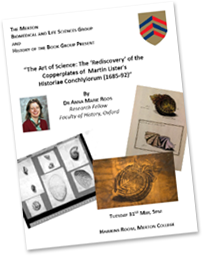 Post edited to add photographs
Post edited to add photographs
A lecture by our Martin Lister Research Fellow Dr Anna Marie Roos on ‘The Art of Science: The ‘Rediscovery’ of Martin Lister’s Historiae Conchyliorum (1685-92)’ will take place at 5pm on Tuesday 31 May in the Hawkins Room of Merton College. The event is a joint meeting of the Merton Biomedical and Life Sciences and History of the Book research groups. Anna Marie is a leading authority on the history of science and medicine in early modern England. Alongside her work for Cultures of Knowledge (for which she is editing Lister’s correspondence), she has published widely in the history of chemistry, as well as on magic and astrological medicine. Her talk will focus on the stunning series of copperplates created by Lister’s teenage daughters to illustrate his groundbreaking compendium of shells, the rediscovery of which last year aroused a great deal of interest.
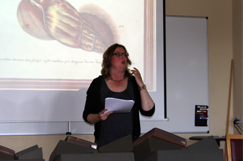
Anna Marie during her talk.
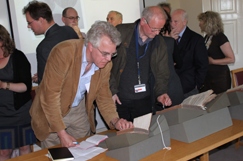
Listerian material from Merton’s holdings.
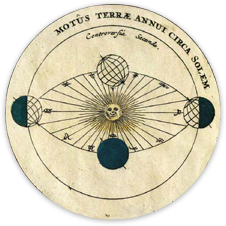 Update: Deadline extended to 18 October
Update: Deadline extended to 18 October
Paper and panel proposals are invited for Scientiae, a new interdisciplinary conference on early modern science, to be held in Vancouver, B.C. (under the auspices of Simon Fraser University) on 26–28 April 2012. According to the organizers, ‘[t]he working assumption of the conference is that interdisciplinarity is not only an option, but a necessity, for the study of early modern culture in its knowledge of the natural world. That is because period science is itself an interdisciplinary function, emerging from Biblical exegesis, advanced design, and literary humanitas; as well as from natural philosophy, alchemy, craft traditions, etc… Scientiae offers a forum for scholars of the period’s art and literature, as well as its intellectual history, to illuminate aspects of early modern science in the latter’s proper strangeness’. The deadline for proposals is 30 September 2011. For the full CFP, please visit the conference website.
James Brown
May 16, 2011
Events, Lectures, Project Updates
Tags: Databases, Editions, Eighteenth Century, Gottfried Wilhelm Leibniz, History of Philosophy, Mathematics, Networks, Seventeenth Century
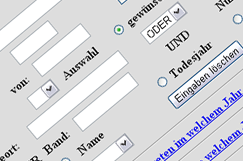
Visit Leibniz correspondence database.
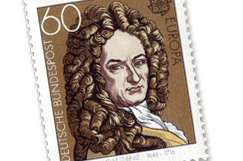
Leibniz depicted on a 1980 stamp.
In the second paper of our seminar series on Thursday 12 May, Dr Nora Gädeke (Gottfried Wilhelm Leibniz Bibliothek) provided us with a privileged insight into ‘Work in Progress: Leibniz’s Correspondence Network’, currently being reconstructed by the Akademie-Ausgabe edition, a group of collaborators in Potsdam, Münster, Hannover, and Berlin, under the aegis of the Academies of Science of Göttingen and Berlin-Brandenburg. In a detailed and reflexive analysis, Gädeke outlined the epistolary activities and contacts of this prolific correspondent, whose surviving letters number c.15,000-20,000, and who saw letter-writing as ‘one of the main characteristics of his life’. She also described the editorial principles and strategies of the definitive, multi-volume Akademie-Ausgabe edition, which include reproducing all items of Leibniz’s corpus chronologically and topically (including all extant copies), as well as the creation of a full critical apparatus. Further, she discussed the practical and conceptual challenges posed by such an ambitious, ‘cinematic’ enterprise. Gädeke concluded her talk, and introduced the question and answer session, by demonstrating the public database of Leibniz’s correspondence, one of a series of innovative online tools developed by the project to facilitate editorial work on the hard-copy volumes and disseminate some key findings beyond the edition itself. Discussion focused on a range of topics, including: the role of patronage in Leibniz’s network; information as a form of ‘social capital’ in early modern Europe; the importance of superimposing places in which letters were sent or received with geopolitical subtleties; Leibniz’s approach to storing and ordering his letters; his motivations for keeping them in the first place; and the key role online databases can play in supporting and publicizing conventional scholarly work on major corpora. Seminars take place in the Faculty of History on George Street on Thursdays at 3pm. For future talks in the series, please see the seminar webpage.
 Podcast now available on the seminar page!
Podcast now available on the seminar page!
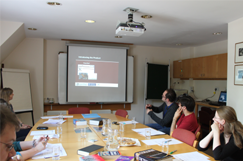
Introducing the product.
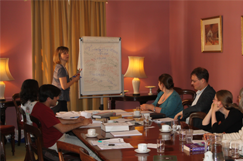
Creating the shortlist.
With the autumn launch of the Project’s union catalogue of early modern letters getting ever closer, and issues of design and functionality now sorted, we are turning our attention to broader questions of digital identity, digital presence, and branding. Heeding UCL digital humanities expert Melissa Terras’s insight that online resources ‘should be taking [their] digital identity and digital presence a lot more seriously’, and aware that ‘naming your brand is the most challenging, momentous, and necessary phase in the process of branding’, we hand-picked a crack team of scholars, librarians, editors, and linguists external to the Project to help us formulate an appropriate appellation for our new resource. Over an intensive ‘logo lunch’ at Linacre College, Dr Kim McLean-Fiander guided our set of sobriquet suggesters through a series of mind-bending puzzles and tasks designed to release creative juices, unlock associative thinking, and lead participants to that elusive ideal name. While the results of the exercise will remain under wraps for now, the input we received was invaluable, and we would like to thank all of the participants for giving us their time.


Podcast now available on the seminar page!






 Update: Deadline extended to 18 October
Update: Deadline extended to 18 October 




 Join
Join 